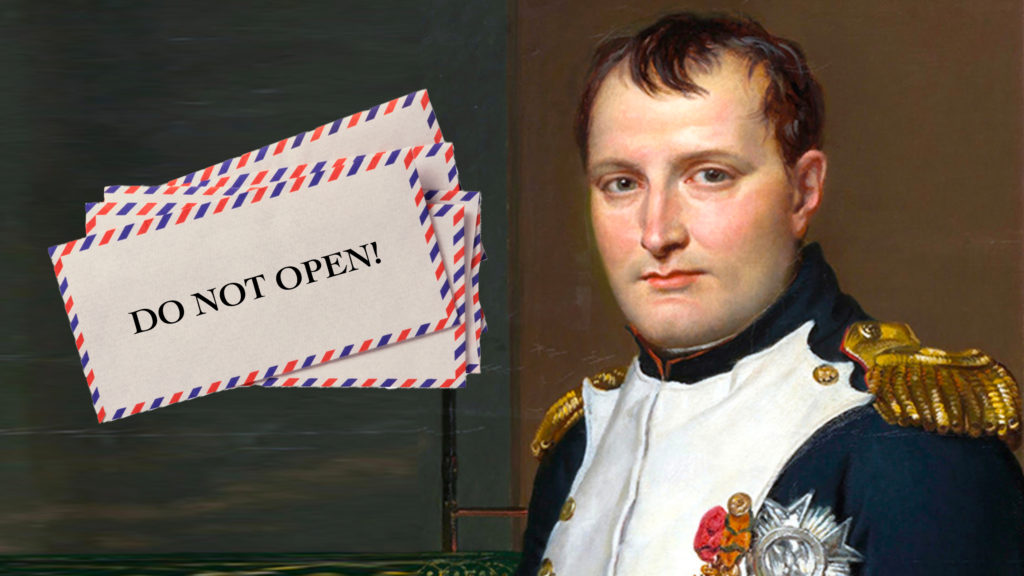
In the waning years before the 19th century in France, Napoleon Bonaparte became general. Now, I won’t get into specific details about it because this isn’t history class . . . But what I can tell you is that Napoleon quickly rose to prominence as a military genius, seeing much success because of his tactical brilliance. And there are many reasons why he was wildly successful—namely his charisma and his prudence—but the attribute I found most interesting was an aspect that today’s society has seemed to forget: delayed gratification.
Let’s face it. Most of us enjoy the exact opposite—instant gratification—and it’s a disease that is threatening our day-to-day lives. Don’t worry, though, because I’m guilty of it, too! With the rising convenience of social media, for instance, the rising convenience to be satisfied instantly has become an issue.
Instant gratification is like Veruca Salt saying I want it now! It’s hitting the snooze button instead of getting out of bed when the alarm chirps in the morning. It’s buying ice cream at the store when the budget only allows for healthy foods this month. It’s skimming through this post I’ve written to get to what is seemingly important . . .
Busted! Hahaha, I gotcha! It’s okay, though—do not worry. (I would have done the same, but stick with me here.) Instant gratification, in a nutshell, is satisfying our needs in the present moment, despite the things we may actually need to do. The first step in understanding our problems is to identify them, and we’ve won half the battle—but we’re not quite generals yet. Let’s get back to Napoleon.
Napoleon was a master at delaying his gratification or satisfaction. Fittingly, he once said, “The reason most people fail instead of succeed is [that] they trade what they want most for what they want at the moment.” Jeez! I’ll tell you, the first time I read this quote, it shook me to my core. In essence, Napoleon is saying this: Hey, fool—don’t give in to instant gratification just because it feels good!
Think of it this way: If my goal is to chisel my core into rock solid abs, I may still be tempted to eat that Whopper from Burger King; and if I give in to my feelings of instant gratification, that Whopper ends up tampering with my desired end results—the rock solid, Brad Pitt abs. (I ate the Whopper.) In terms of Napoleon’s quote, I failed because I traded my long-term goal of rock solid abs for the instant pleasure of a Whopper.
If that’s too contemporary for you, consider what Napoleon did.
During his reign, Napoleon instructed his secretary Bourrienne “to leave all letters unopened for three weeks,” unto which Napoleon noticed that most of the issues written in the letters had resolved themselves, which “no longer required an answer.” How brilliant! From his secretary’s memoirs, Bourrienne describes, “By not opening [the] letters, Bonaparte was spared the unpleasing office of refusing.” Napoleon let things work out themselves by delaying his need to be informed—his version of gratification. It was a productivity hack, and it worked for Napoleon.
When I first read about this tactic of Napoleon, I immediately put it into practice. My email box had become cluttered, and I found it difficult to keep up with the demand for so many (often unnecessary) replies. First, I uninstalled the Gmail app from my phone (that, in itself, worked wonders), and then I subsequently decided to no longer check my email until each morning during my routine. Once I checked my email in the morning, I did not worry about it for the rest of the day. I delayed my gratification for checking my inbox, and I ultimately had more time (and less stress) to focus on the things which were most important.
I’ve since learned that the feelings of instant gratification often leads to impatience, which leads to anxiety, which leads to a whole bunch of problems. But I have to remind myself of this: What’s the worst that could happen? What bad could happen if I just delayed checking my email for 24 more hours? In most cases, the answer is not as severe as I think.
When we learn to accept that not everything can be instantaneous, we can spend less time worrying and more time taking action.
Do you think Napoleon ever got antsy when delaying his mail? Maybe. There could have been some really important strategies lying in those letters. (Maybe even some juicy gossip about the latest guillotine victims!) More often than not, some of the letters “were themselves answers; some were acknowledgments of letters received; others contained requests for favors already granted”—aka, unnecessary chatter. Napoleon decided that there were more important things to him than the stresses of dealing with often unimportant matters.
Instant gratification has taken our society by storm, but not in a good way. It is detrimental to our livelihoods and even to our mental health. By delaying in the moment what we think is important, we may not lose sight of our desired end results (or, what we know to be important). It’s our discipline and our focus that keeps us in line. It was Napoleon’s commitment to his livelihood that forced problems to resolve on their own. And after putting this into practice, we will soon become the generals (like Napoleon) of our own minds, fighting our own revolutions for the betterment of our livelihoods.
References
Emerson Central. (2021, May 18). Napoleon; Man of the World. Ralph Waldo Emerson. https://emersoncentral.com/texts/representative-men/napoleon-man-of-the-world/
